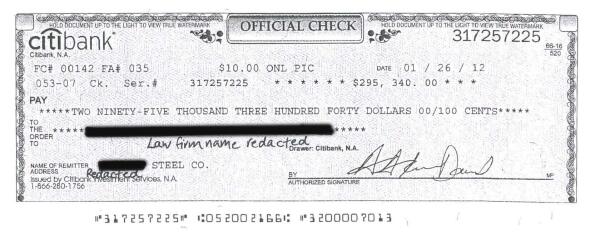Beware Of Email and Internet Scams
 The rise of the Interest has brought with it a concurrent rise in email and online scams. Some of these target lawyers. Be on the lookout for them.
The rise of the Interest has brought with it a concurrent rise in email and online scams. Some of these target lawyers. Be on the lookout for them.
In one scam Lawyers Mutual learned about, the scammer used a real lawyer as the first point of contact. In this case, the North Carolina lawyer received an e-mail purported to be from a Connecticut lawyer indicating he was going into the hospital for heart surgery and needed to refer a client for a collection matter in North Carolina. The Connecticut lawyer advised that his client would be getting in touch with the North Carolina firm soon. Because he was going in for heart surgery, he would not be able to talk further with the North Carolina lawyer.
There was in fact a Connecticut lawyer with the name used in the referral. However, he had no idea someone was using his name. The prospective client, a German company, contacted the North Carolina lawyer and asked the lawyer to send a demand letter to a company in Statesville. The client indicated that collection should not be difficult with the threat of a lawsuit. The client provided a copy of a sales agreement between the client and the Statesville company and told the lawyer that $500,000 was still owing on a $915,000 steel order.
The lawyer was instructed to send the demand letter. In just a few days a UPS package arrived at the lawyer’s office with partial payment of $295,000 in the form of what appeared to be an official bank check from Citibank (copy of the check below). Interestingly, the UPS package that was purportedly from the Statesville company came from Canada. If the lawyer were to deposit the check into the firm’s trust account and disburse against this check, he or she would soon discover that the check was a fake.
Because the initial referral from a licensed Connecticut lawyer seemed legitimate, it would have been easy for the lawyer to let his or her guard down. However, there were red flags:
- The Connecticut lawyer was unavailable to discuss the referral.
- Collection was far too easy and happened very quickly.
- The UPS package arrived from Canada.
Tips for Protection
You can avoid falling for these scams by taking some simple precautions.
- When dealing with new out of state or out of country clients, do some basic investigation of the prospective client and the debtor. Contact the debtor company to verify that it actually has a business relationship with the prospective client.
- Insist on wired funds and verify that the wired funds have cleared before disbursing.
- Require the prospective client to pay a retainer and refuse to do anything until you have received the retainer in the form of wired funds. It is highly unlikely that a scammer is going to pay a retainer in this situation and take the risk of losing that money.

Earlier Twist on This Scam
In 2010, Lawyers Mutual informed its insureds of a similar scam going around the web. It worked in essentially the same way as the above-described scam. Lawyers were contacted by an out of state – or more likely, out of country – prospective client. This person tells the lawyer they would like to hire the lawyer to collect a debt owed by a person or company in North Carolina. The prospective client provides the lawyer with the contact information for the debtor, and the lawyer sends a collection letter.
Amazingly, in just a few days, what appears to be an official bank check arrives in the mail. If the lawyer relies on this “official” check and disburses the funds to the new client, the fakery would be revealed. There would be a trust account shortfall.
Additional Help
In both of the above incidents, Lawyers Mutual sent a “Risk Management Alert” warning our insureds of the scams. You can view a copy of the 2010 alert here.
To stay abreast of the latest email scams, check out Dan Pinnington’s blog “AvoidAClaim”. He discusses current scams and shares typical fraudulent emails.
If you are targeted by a scam, you should contact law enforcement agencies and notify Lawyers Mutual so that we can spread the word to our insureds.
For more information, visit our client services/risk management resources.




